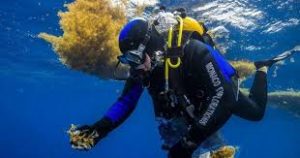Breaking science: unreported marine heat waves are striking more often and more violently in the seas. Scientist Eric Oliver explains. Then Mark Eakin, the coordinator of NOAA’s Coral Reef Watch reports the latest science: up to half of the Great Barrier Reef of Australia has died in the longest marine heat wave ever seen.
Most of the extra heat we generate with greenhouse gas emissions goes into the ocean. Hidden beneath the waves, that is where the climate action is. I’m Alex Smith. Welcome to Radio Ecoshock.
Listen to or download this Radio Ecoshock show in CD Quality (57 MB) or Lo-Fi (14 MB)
Or you can listen to each guest interview separately. Be sure to pass on these links!
Listen to or download my 28 minute interview with Eric Oliver in CD Quality or Lo-Fi
Listen to or download my 29 minute interview with Mark Eakin in CD Quality or Lo-Fi
ERIC OLIVER: MARINE HEAT WAVES INCREASING AND LASTING LONGER – AROUND THE WORLD
For years we have been told that most of the extra heat from our greenhouse gases goes into the ocean. But what is happening there? I’ve written to experts around the world trying to get the big picture of marine warming. Crickets. Finally, we have a new paper published in the journal Nature. It warns us about marine heat waves.
The lead author is Dr. Eric J. Oliver. He earned his Ph.D. in Physical Oceanography from Dalhousie University, in Canada’s Maritime province of Nova Scotia. Eric has also been a Post Doctoral Fellow at the University of Tasmania. Many of his co-authors are Australian with more authors from the UK, particularly Scotland, and the United States.

Dr. Eric Oliver
Eric and 14 other scientists from around the world have released an important new study in Nature Communications. The title is “Longer and more frequent marine heatwaves over the past century“. This is an open text paper, so you can look into it yourself.
The abstract for this paper says:
“We find that from 1925 to 2016, global average marine heatwave frequency and duration increased by 34% and 17%, respectively, resulting in a 54% increase in annual marine heatwave days globally. Importantly, these trends can largely be explained by increases in mean ocean temperatures, suggesting that we can expect further increases in marine heatwave days under continued global warming.”
And you should read this from the paper’s introduction:
“Notable events occurred in the northern Mediterranean Sea in 2003, along the Western Australian coast in 20114, the northwest Atlantic in 2012, the northeast Pacific over 2013–2015, off southeastern Australia in 2015/16 and across northern Australia in 2016.
These events resulted in substantial ecological and economic impacts, including sustained loss of kelp forests, coral bleaching, reduced surface chlorophyll levels due to increased surface layer stratification, mass mortality of marine invertebrates due to heat stress, rapid long-distance species’ range shifts and associated reshaping of community structure, fishery closures or quota changes, and even intensified economic tensions between nations.”
We talk about all sorts of cases of marine heat waves in the interview. Eric, a Maritimer from Halifax, describes how the 2012 heat wave off Nova Scotia and New England created a lobster boom, which then crashed lobster prices and actually damaged the industry.
For West Coasters, there was “the blob” of strangely hot weather that hovered off the coast of British Columbia, Washington State and Oregon for two years. That one affected the atmosphere, and changed the weather. The ocean can have a big effect on our weather. Just think about how hurricanes (typhoons in the southern hemisphere) are made stronger and more violent by hotter waters. Now think of a hurricane passing over a marine heat wave. That is a recipe for disaster.
The very worst have been around Australia, and you will hear about the mass killing of coral from our second guest, Mark Eakin of Coral Reef Watch.
The main thing to learn is: (a) the oceans are gradually heating up, along with a hotter atmosphere but (b) on top of that gradual warming we now find extreme ocean heating events. Those marine heat waves are popping up more often, in more places, and lasting much longer. Ecosystems can be destroyed, species moved, and a long list of other serious impacts.
I ask Eric if he thinks we will see unexpected ecological shifts in the future as marine heat waves get worse. He replied we have already seen this happen. In 2011 a marine heat wave around normally cool waters of the Australian island of Tasmania changed the ecosystem apparently permanently. The “forests of the sea” – kelp forests – died off to be replaced by sea grass. All the marine life dependent on kelp forests disappeared. New creatures came to the sea grass.
Of course we can’t see that without diving under water. I vaguely heard about it at the time. No doubt it was reported in Australia. But the rest of the world does not know that a marine heat wave can change the living landscape under the waves.
As I reported in a previous show, the Tasman Sea just had a marine heat wave. Tasmanian seas are generally for cold water species. In North America, when waters warm off the coast, cold-loving species can swim further north. But in Tasmania, there is no coast further south. It’s just around 3,000 miles of open ocean until you reach Antarctica. So those species displaced by extreme heat have nowhere to go.
Tasmania is losing it’s giant kelp forests, and even aquaculture operations are under stress.
For statistical reasons, involving the days of ice cover, the Arctic Ocean was not included in this study. Now that he’s back in Canada, Eric Oliver hopes to look into marine heat waves in the Arctic soon.
This paper says the current ocean warming is .16 degrees C per decade. Over the past century, that makes the sea 1.6 degrees hotter – a greater heating than the accepted global average of about 1.1 degrees C (although that number doesn’t account for the masking effect of pollution). It looks like the ocean is heating faster than the world as a whole!
More from the paper:
“The global average for marine heat waves was about 2 events per year in the early 1900’s, but in the last 30 years went to 3 per year, and in very recent years to 4 events per year. It’s a 34% increase in frequency.
In the early 20th century, the average marine heat wave was about 10 days long (a global average). In the last 30 years they have lengthened to an average of 14 days long (a 17% increase in duration). These marine heat waves are coming faster, and lasting longer, as the world warms. And remember, these extreme events can CHANGE ecosystems, apparently sometimes irreversibly. The extremes matter a lot, even more than the gradual warming.
If we examine the number of days of exposure to extreme marine heat, that number has increased by over 50% since the early 1900’s. What was 30 days of exposure has become 40 to 45 days.”
Now the marine heat wave group is working on using climate models to use their data to predict how this trend will develop during the rest of this century.
In our interview, Eric Oliver says:
“Regardless of how we change our emissions, the climate has so much inertia now from the emissions we have already put in the system – it’s not going to start cooling right away. So even if we were to stop emitting greenhouse gases right now, it’s going to continue warming for at least the next two decades. And so we can expect these trends [in sea surface temperature increases and marine heat waves] to continue, regardless of what we do, at least for the near future.”
A CURRENT EXAMPLE OF EXTREME SEA SURFACE TEMPS AFFECTING THE EXTREME PRECIPITATION EVENT THAT HIT THE U.S. WEST
Meteorologist Jeff Masters just wrote about hotter seas creating unstable wet weather in California:
“At the base of the Pineapple Express, sea surface temperatures have been running more than 1°C (1.8°F) above the seasonal norm from Hawaii all the way to southern California. This means that air flowing from the surface and converging into the Pineapple Express would have a chance to be carrying greater-than-usual amounts of low-level water vapor, thus intensifying the moisture channel.”
SEE ALSO
The rise and fall of the “marine heat wave” off Western Australia during the summer of 2010/2011
Alan F.Pearce Ming Feng
“Record high ocean temperatures were experienced along the Western Australian coast during the austral summer of 2010/2011…This heat wave was an unprecedented thermal event in Western Australian waters, superimposed on an underlying long-term temperature rise.”
AND
An extreme climatic event alters marine ecosystem structure in a global biodiversity hotspot
Thomas Wernberg, et al.
Eric Oliver and his team are certain these marine heat waves are due to our fossil fuel emissions. If we keep burning fossil fuels, marine heat waves will become stronger and more common. Massive damage will result, as we hear in our next interview.
THE GREAT CORAL DIE-OFF – MARK EAKIN OF CORAL REEF WATCH
The world’s biggest structure built by living organisms is not Tokyo or New York. It is the Great Barrier Reef off Queensland Australia, in the Coral Sea. It is over 1400 miles long, 2300 kilometers. It is a nursery for countless ocean species. And as we learn in a horrifying new scientific report, the Great Barrier Reef is dying, killed by the hot seas of global warming.
In June 2016, the year of the disaster, I interviewed the world’s greatest coral expert, Charlie Veron. His life work of exploring and cataloging the wonderful world of coral was being killed off. This isn’t just a sign of climate change. This is the time of ecological emergency.
The title of the new paper published in the journal Nature is “Global warming transforms coral reef assemblages“. We have reached co-author Dr. C. Mark Eakin. The lead author is Professor Terry P. Hughes, Director of the ARC Centre of Excellence, Coral Reef Studies in Australia.
Mark Eakin is the Coordinator of the “Coral Reef Watch” run by NOAA, the U.S. National Oceanic and Atmospheric Administration. As they say at the site: “NOAA’s Coral Reef Watch provides the only source of satellite-based monitoring, alerts, and warnings of upcoming coral mass bleaching events.”

Dr. Mark Eakin
Our interview is filled with a kind of horror story unfolding just in the last three years. About half of the Great Barrier Reef has died off.
Technically, some of those reef areas might regrow. But that can only happen if there isn’t another marine heat wave within the next ten years or so. That’s how long it can take coral to recover. From what we’ve seen so far, another heat wave seem inevitable before ten years.
The other thing: as Mark Eakin tells us, a coral reef is either being built or being torn down. During the same ten year period, a whole range of factors can wreck parts of the reef. These include shipping damage (don’t build a coal port near the reef Mr. Adani!!), strong storms (we only see more of them), and shore-based pollution. Right now the dead reefs are getting covered with a rather gray slime. Clownfish will poke away, breaking coral. Nature has her ways of erosion. Only living coral can keep up.
You should listen to this interview. Then, if you have access to Netflix, they have a great film: “Chasing Coral“. Mark recommends that to everyone (and I think he’s in it!)

Mark Eakin at work
THE DANGER OF EXTREMES
In his new paper on marine heat waves, Eric Oliver and his team write:
“We conclude that extreme climatic events are key drivers of biodiversity patterns and that the frequency and intensity of such episodes have major implications for predictive models of species distribution and ecosystem structure, which are largely based on gradual warming trends.”
In the science world, there is a growing awareness of the dangers of extremes. If rains increase a little or decrease a little, nature adjusts. A little hotter and we all get by, even as the “normal” base continues to warm as each decade passes. But extreme precipitation events are blowing in across the globe, while droughts last longer, forest fires burn earlier, later, and then all year round.
As our guest Eric Oliver told us, there is no global monitoring system for marine heat waves. Just this week, a bottle-nosed dolphin was spotted in what should have been the cold waters off Vancouver Island, on Canada’s West Coast. That should never happen. We need a marine heat wave warning system for the sub-tropics, as provided for the tropics by NOAA’s Coral Reef Watch. All of us on land should be told what is happening in the seas, along with our weather forecasts. We need to see the maps.
The public hardly knows it, but marine heat waves are the next big thing.
My listeners educated me as do my guests. Feel free to write me anytime. The address is radio@ecoshock.org.
You can help the future. Please pass on this radio show through social media and wherever you travel on the Internet. And keep supporting your non-profit radio station who keep this vital information beaming out. I’m Alex.
You can also help this program by joining a small but determined group of listeners who donate $10 a month to Radio Ecoshock. That is easy to set up (no bank required) – find out how on this page. I am so grateful to those monthly donors – they keep me going, when the going get’s tough.
Please join us again next week, for more Radio Ecoshock.
Alex

Alex; Do you still think Guy McPherson is a nut job for his near term human extinction predictions?
Hi Larry.
I have never thought or said that Guy McPherson is “a nut job”. I continue to (a) appreciate his collection of positive feedback loops, and (b) disagree that his time-frame for human extinction is possible.
While we should expect many surprises, and the arrival of severe impacts sooner than science or government seems willing to talk about – the laws of physics still apply, and some things take time.
For example, I have just spoken with the lead author of a study on the slowdown of the Atlantic overturning circulation (which includes the Gulf Stream). The sudden shift to a freezing North America and Europe, shown in the movie “The Day After Tomorrow” is not going to happen in our lifetimes. But that does not mean it will never happen.
In any case, I am not a scientist, and I think the problem of how fast global warming will manifest is still unsettled, partly because we do not know how humans will react or adapt, if we do.
Apologies; I did not mean to be facetious.
My concerns for the planet, apart from climate change, include the continuing degradation of the water,air and land. I remember back in the 80’s, watching a show called “After the Warming” by James Burke. In it he predicted, with some accuracy, the stopping of the Gulf Stream, and the numerous meetings and reports that would be released, and ignored.
I have been following these concerns for most of my 65 years.